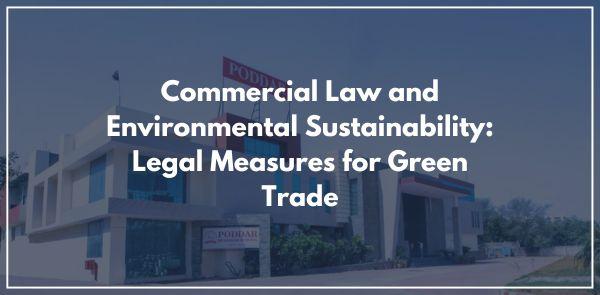
Introduction
In recent decades, environmental sustainability has become a critical concern in global commerce. Governments, businesses, and individuals increasingly recognize the need to address climate change, conserve natural resources, and promote sustainable development. Commercial law plays a pivotal role in advancing these objectives by establishing legal frameworks that encourage green trade and environmentally responsible business practices. This article explores the intersection of commercial law and environmental sustainability, highlighting key legal measures that facilitate green trade.
Understanding Green Trade
Green trade refers to the exchange of goods and services that contribute to environmental sustainability. This includes products with minimal ecological footprints, renewable energy technologies, and services that promote environmental conservation. Green trade also encompasses sustainable business practices in global supply chains, such as reducing carbon emissions, minimizing waste, and adopting circular economy principles.
Legal Measures Supporting Green Trade
Several legal measures within commercial law aim to promote green trade. These measures can be broadly categorized into regulatory frameworks, trade incentives, and enforcement mechanisms.
1. Environmental Regulations in Trade Agreements
International trade agreements increasingly incorporate environmental provisions to ensure sustainable practices. Many modern free trade agreements (FTAs) include chapters dedicated to environmental protection, such as:
- Provisions promoting the trade of environmentally friendly goods and services.
- Commitments to enforce domestic environmental laws.
- Mechanisms to address disputes related to environmental violations.
For instance, the United States-Mexico-Canada Agreement (USMCA) includes commitments to combat illegal wildlife trade and promote sustainable forest management.
2. Green Tariffs and Subsidies
Governments use tariffs and subsidies to incentivize environmentally friendly trade practices. Green tariffs impose higher import duties on products that fail to meet environmental standards. Conversely, subsidies for green industries encourage the production and export of sustainable goods, such as renewable energy equipment and eco-friendly technologies.
3. Corporate Sustainability Reporting
Corporate laws in many jurisdictions now mandate sustainability reporting as part of commercial operations. Companies are required to disclose information about their environmental impact, such as carbon emissions, energy consumption, and waste management practices. Such transparency fosters accountability and incentivizes businesses to adopt sustainable practices.
4. Environmental Certification and Standards
Certification schemes and standards play a crucial role in green trade by distinguishing environmentally friendly products from conventional ones. Legal frameworks support these certifications, such as ISO 14001 for environmental management systems and the Forest Stewardship Council (FSC) certification for sustainable forestry. These certifications not only enhance consumer trust but also create legal assurances for green trade.
5. Carbon Trading Mechanisms
Carbon trading, a market-based approach to reducing greenhouse gas emissions, has gained prominence as a legal tool for environmental sustainability. Under these schemes, businesses can trade carbon credits to offset their emissions. The European Union Emissions Trading System (EU ETS) is a prime example of such a mechanism, enabling businesses to comply with environmental targets while fostering green trade.
Challenges in Implementing Legal Measures
Despite the progress made, several challenges impede the effective implementation of legal measures for green trade:
- Lack of Harmonization: Disparities in environmental standards and regulations across jurisdictions create barriers to green trade.
- Enforcement Gaps: Weak enforcement mechanisms in some countries undermine the effectiveness of environmental provisions in trade agreements.
- Trade-Offs with Economic Growth: Balancing environmental goals with economic growth remains a contentious issue, especially for developing nations.
- Greenwashing: Misrepresentation of products or services as environmentally friendly can erode consumer trust and undermine green trade efforts.
Future Directions
To strengthen the role of commercial law in promoting environmental sustainability, policymakers and stakeholders must:
- Harmonize international environmental standards to facilitate green trade.
- Strengthen enforcement mechanisms to ensure compliance with environmental regulations.
- Promote public-private partnerships to drive innovation in sustainable technologies.
- Educate businesses and consumers about the benefits of green trade and the risks of greenwashing.
Poddar International College is one of the best colleges in Jaipur, merging commercial law with sustainability, giving graduates exposure and real-life experience in green trade norms. Through its holistic development approach and excellent placement opportunities, it develops future professionals equipped to promote sustainable business practices framed against the backdrop of law.
Conclusion
Commercial law serves as a vital tool in advancing environmental sustainability by regulating and incentivizing green trade. By integrating robust legal measures, governments and businesses can align economic activities with environmental goals, fostering a more sustainable future. As the global community continues to prioritize climate action, the intersection of commercial law and green trade will remain a critical area for innovation and reform. Strengthening legal frameworks, improving compliance, and fostering international cooperation will be essential steps in ensuring that commercial activities contribute to a greener, more sustainable world.
